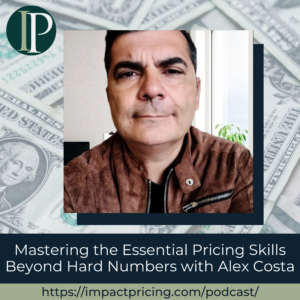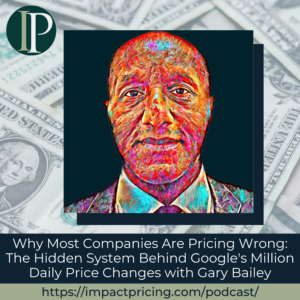Alex Costa is a Specialist in Strategic Pricing, statistical analysis, market intelligence, sales finance (P&L) statistical analysis, acting as a Sales Business Partner to guide the best pricing strategies, which increases revenues and margins (EBITDA).
In this episode, Alex discusses the importance of both hard and soft skills in achieving success. He also highlights three of the eleven essential skills for pricing professionals and shares his insights on value-based pricing, emphasizing its comprehensive impact on the value process.
Podcast: Play in new window | Download
Why you have to check out today’s podcast:
- Find the optimal skills to prioritize as a pricing professional
- Discover effective techniques for engaging with salespeople in a manner that fosters collaboration instead of resistance
- Learn how to share information and knowledge within the company to foster a collaborative effort towards achieving shared objectives
“Hard skills and soft skills play a huge impact for you to be effective in your career in pricing.”
– Alex Costa
Topics Covered:
01:04 – How Alex pursued pricing
01:54 – Pricing is more than margin
02:47 – What he thinks is the best skill pricing professionals should have
04:16 – Why one has to think logically as a pricing professional
05:05 – Consultative versus reactive when engaging with sales
07:02 – How to invite collaboration rather than resistance from salespeople
08:55 – Discussing on the idea of sharing knowledge and information inside the organization
11:16 – Why emotional control matters
16:22 – What he thinks of value-based pricing
18:16 – Who should take the role of training sales teams for them to understand your product’s value
19:26 – Looking at value not just of the product’s attribute but the whole chain of it
21:53 – How you can get a hold of Alex’s paper with this 11 skills
22:29 – Alex’s best pricing advice
Key Takeaways:
“I think the most important thing to us as pricing professionals is to engage with sales objectives, to understand what the goals of sales teams are. But of course, align with the goals of the organization.” – Alex Costa
“If you don’t control your emotions, your emotions will control your career and your project.” – Alex Costa
“When you look for the satisfaction from the customer, what their perspective of the value that they will take from your product or services, you can position your pricing better.” – Alex Costa
“Sometimes they think, value comes just from the aspects of the product, the attributes of the product. But for me, the value in the mind of the consumer and the customers comes from the entire chain of value of the company.” – Alex Costa
Connect with Alex Costa:
Connect with Mark Stiving:
- LinkedIn: https://www.linkedin.com/in/stiving/
- Email: [email protected]
Full Interview Transcript
(Note: This transcript was created with an AI transcription service. Please forgive any transcription or grammatical errors. We probably sounded better in real life.)
Alex Costa
Hard skills and soft skills play a huge impact for you to be effective in your career in pricing.
[Intro]
Mark Stiving
Welcome to Impact Pricing, the podcast where we discuss pricing, value, and the behavioral relationship between them. I’m Mark Stiving, and our guest today is Alex Costa. And here are three things you want to know about Alex before we start. He started Attitude Pricing in 2022. He’s led pricing in several different companies since 2007, and he plays in a rock and roll band and is a huge fan of music. Welcome, Alex.
Alex Costa
Oh, thanks, Mark. Thanks for having me. It’s a pleasure to be here with you.
Mark Stiving
Oh, thanks. It’s going to be a fun conversation. So, tell us how’d you get into pricing?
Alex Costa
Well, Mark, I started the pricing in sales in a consumer good company. And curious because I had this curiosity to learn why people inside the companies keep saying, oh, I don’t have margins to invest in customers. I don’t get to give you more discounts. And this curiosity has led me to get into pricing. Here I am 15 years after working in pricing in these industries that you just mentioned.
Mark Stiving
Yeah. So it’s kind of funny that people think that I don’t have enough margin. And if you’re anything like me the margin has nothing to do with pricing. I mean, it’s the end result of pricing. But it certainly isn’t what we think of when we think of pricing.
Alex Costa
Yeah. That’s it. Margin is just the result that comes from the pricing that you set for your product or service, but it’s not the target that we have to pursue. In fact, we have to understand the market, all the things that impact prices, sometimes we have to work with low margins.
Mark Stiving
Yeah. So, you put together, what we’re going to talk about today, by the way, is you put together a list of 11 skills that pricers need or should have. And I’d love to chat with you about some of these just because they look interesting and fun and it’s always good for pricing people to know what skills they could and should be working on. But instead of me tossing one out to you, let me ask you, which is your favorite? Which do you think is the most important skill for pricing people to be focused on?
Alex Costa
Yeah, let me just try a little bit of context here. First of all, when I started my career, I think, just studying and getting some, let’s say, college grades and hard skills would be enough to achieve the goals in my career. And during my career, I realized that the soft skills play a huge role to achieve the best goals I had in pricing. But responding to your question, I think the most important skill for me, I think it’s to being sales partner of sales team because during our conversation, you see that it’s controversial in my part being a pricing professional. But let’s see from my perspective, prices are made to let’s say put a monitor symbol, let’s say that way, to sell products and services. So, for me, pricing helps save, sell products and service in the organization. So between my 11 competences, there is one that I like most, that is, being a sales partner with sales teams.
Mark Stiving
So, I’m going to take a step back for just a second. If you think about your own mind or your own mental state, do you think that you’re more logical based or, and that’s why the soft skills didn’t come as quickly?
Alex Costa
Oh, I don’t know if, of course, I’m a logical professional, but I think it comes to me because of the hurdles I had to face in my experiences in my career that brings me those soft skills. It’s an important part of the ability that the pricing professionals had to deal with every day.
Mark Stiving
Yeah, I think that’s true. I was very logical. Hopefully I still am a little logical, but I was very logical and I found these soft skills. They were hard for me to come by. Right. I had to work at them and have some really bad experiences to get to them. So it was, it’s good that you found them quickly. So what do you think it takes to be a good partner to salespeople?
Alex Costa
I think the most important thing to us as pricing professionals is to engage with sales objectives, to understand what the goals of sales teams are, but of course align with the goals of the organization and try to be consultative, not reactive towards these goals. You have to guide the salespeople to facilitate the way that they will reach these sales goals. It’s interesting because I’vehad some experience in the past that some pricing managers creates a wall between the both teams pricing teams and sales teams, instead of create a bridge where they will get together and understand the objectives of both teams and this bad experience, brings me some bad experience because I think as a pricing manager we have to work as a collaborative way. Let’s say pricing managers should take away all bureaucracies, all the things that could not be able to allow sales teams achieve their goals.
Mark Stiving
That’s a really interesting concept because if we think about the wall for a second, I could see why companies want to build the wall between pricing and sales. And that’s because pricing people want higher prices. Salespeople tend to want lower prices, and salespeople are more persuasive than pricing people are. And so if we build the wall, it keeps salespeople from persuading pricing people to give discounts. And what we really need is we need pricing people who are confident enough in the value, they can have conversations with salespeople. And it isn’t that we have to persuade them. We have to help them sell our products at the prices we think they deserve.
Alex Costa
Okay, Mark, but let me now bring the hard skill. That’s why I push pricing professionals to understand deep the concepts of data. When you know all the data inside of your organization about your customer, you can argue against these persuasive teams that we have some point, okay, we want to hear you, we want to partner with you, but here, lets see the numbers. The numbers tells us that it’s not the time to concede a huge discount. It’s not the time to invest in that customer. But again, you have to have soft skills to bring these conversations into more, let’s say, collaborative ways. You don’t have to push and force the teams that, oh, no, you don’t have to give this discount. We just bring data and then we can show the sales teams that in this moment is not able to consider discounts. But can you see that it’s different when you bring data, when you try to make them be part of the decision is different when you say, just put a wall and say, no discounts for this customer. If you don’t understand why, you probably create a resistance and a conflict.
Mark Stiving
Yeah. I think that’s a great answer. It’s always easier to say to salespeopleI’m not sure why we need to give this discount because these other five salespeople were able to win the deal at the regular price or at this price. Yeah. And so if we could demonstrate that it’s feasible and possible to win the deal, then we could push back and hopefully not give as many discounts, not give as much discounts. So yeah, having that data is really key. Do you have another favorite or do you want me to pull one out?
Alex Costa
Okay. Let me see. I think sometimes you have to share knowledge inside the company, because I used to say that pricing is, as a pricing professional we don’t create data to set prices we just consume data from different areas inside the company, of course, outside the company. So sometimes you have to be together. Sometimes now, every time you have to be together with these internal areas, then you have to share knowledge. You have to explain and show the benefits that pricing brings to the organization. And when you share the knowledge, when you make the peers know the intricacies of the pricing, the benefits, they feel they belong, and they will facilitate the information. You take off locks in the informational process. And probably it helps you get an easier way to accomplish the pricing goals.
Mark Stiving
Yeah. Since, and so, not only do we want to, in my opinion, not only do we want to share knowledge and information, it’s really nice to be collaborative and find out what everybody else is trying to get accomplished as we set these prices and pricing strategies so that the people inside the company A, know that we listen to them and B, when we come back and say, here’s why we did this, they know they were part of that process. So usually that’s much more effective.
Alex Costa
Yeah. More further than that. they will, let’s say they will prioritize the demands from pricing because it’s a human behavior as well. as you treat people like they belong, they will facilitate your communication with them. This competence, Mark, it’s like a change management approach. It’s a good focus on the people aspect inside of the projects or companies. And of course talking about the pricing aspects.
Mark Stiving
Yeah. So if I get to choose my favorite up here which would it be? It’s pretty hard. I’m going to choose emotional control.
Alex Costa
Oh man. This is the key.
Mark Stiving
Tell me why you added this to your list?
Alex Costa
I have to tell you something. When I first developed this concept, it was competence that I think for the pricing professional. But I had the peculiar experience that I lost my temper, just to be honest with you. And as I will say to you, even though we need to be empathic with people, we treat people well, we share knowledge, you do everything towards the best interest of the company, there will always be in pricing some individual that will resist to be on your side. They’ll try to make everything to you not accomplish your goals to succeed and change the, let’s say the culture of the company towards a pricing culture. It’s because everybody knows that inside the organizations, there is a common phrase that says, I always do that like this. I don’t want it to change. When you bring something new, there is always be someone that will block your hold. I used to say, just to finish my fault here, if you don’t control your emotions, your emotions will control your career and your project. So I think that, be composed, be in control of your emotions because if you lose your temper, as I mentioned to you that it happens to me, probably you weaken your position inside the company and of course, inside your project and everything’s going to fail.
Mark Stiving
okay. So I think the reason I like that one the best is because I was just like you. I used to lose my temper. And anytime you lose your temper, you actually lose control of your thinking. you lose control of the situation. And you never ever look back and say, wow, I’m glad I lost my temper. Never
Alex Costa
Never, never. You’ll regret it, forever is too much time. But I think you do regret thinking about it, how could you do something different.
Mark Stiving
Want to know what I learned?
Alex Costa
Okay, I want to learn from you.
Mark Stiving
And I don’t know if anybody else uses the same trick, but I learned there were two things that really started me focusing on not losing my temper. And the first one was, I would always focus on the objective, right? Yeah. If I could get myself out of it and just think about what’s the objective of the program, then it would really help me to just say, oh, no, no, this is the objective. Don’t worry about me or how I’m being treated or what’s going on. And then the other saying that I use all the time do you want to be right or effective?
Alex Costa
Perfect.
Mark Stiving
Right? And so you’ll lose your temper if you want to be right. And if you want to be effective, you got to go along, you got to do something else. Get along with people. So, I love that. You have to have control over your emotions.
Alex Costa
Okay? I’ve incorporated these tips in my way of thinking, but, normally, people say that we don’t take things personally. It’s hard. I think it’s the same way to say what you just said. It’s not, take things personally. We have to move on and keep focus on the main objectives of the company or the project we are inside. But, I have to confess again, there are some individuals that are specialists in making us lose our temper.
Mark Stiving
I couldn’t agree more. Another really quick story, if you don’t mind, I don’t think I’ve ever told this one on the podcast before. There was a guy early in my career that I don’t know why, but it felt like he hated me. And of course, I didn’t like him either, so it was even, and I was taking a course called Dale Carnegie, and one of the things they teach you in this course is to give a sincere compliment. Okay? And so I thought about this guy and I said, what’s something that I really like about this guy? And I thought hard about it, and I came up with a really good compliment and I gave him this compliment, and it changed our relationship. I was so amazed at the impact of the single thing that happened. I think if we look for the best in people, we say nice things to people, it changes the way people react to us and respond to us. So, I thought that was really interesting.
Alex Costa
The strategy works.
Mark Stiving
Yeah. They don’t always work, but that one did, so I was pretty happy. So let’s talk about value-based sales, which is quite possibly my favorite topic. What do you think of when you think of value-based sales and how do you think pricing people should be involved?
Alex Costa
Yeah. This is a topic that I really like because I learn a lot from reading your books. Yeah.
Mark Stiving
And thank you.
Alex Costa
I think, especially here in Brazilian markets, it’s something that we are struggling to reach, I don’t know in other countries in the other let’s say companies that I didn’t work at yet, butI think the perspective should be the satisfaction of the customer. Here in Brazil, there is a lot of a cost-plus margin in operation. Sometimes you see companies following their competitors, but I think there are tricks over here as well, because I used to say, if the competitors make some mistakes, we follow as well. But when you look for the satisfaction from the customer, what their perspective of the value that they will take from your product or services, you can position your pricing better. You can understand their willingness to pay that they bring into the place to make the decision of this pricing thing. But as I just said, sometimes the companies here in Brazil struggle to understand that. That’s why I created Attitude Pricing to, let’s say, share knowledge to give some experience to bring all together and we start to not focus only on costs and competitors.
Mark Stiving
Yep. Absolutely. So, that would be, as pricing people trying to set prices based more on value. Do you think pricing people should be coaching sales on what the value is and how to sell value? Or does that belong somewhere else in the company?
Alex Costa
Well, MarkI think pricing could and should do this perfectly, but sometimes even inside the pricing professionals community that I chat or I make some conversation with, they still see pricing as financial and, like we talk about in the beginning, that this conversation focuses more on margins, on the results of pricing. And I think its pricing needs to be more, let’s say, mentored or trained to understand that they have the power to take this future of sales-based prices to sales teams. But there is one thing that I have to share with you. I know you, there are a lot of discussions where pricingshould sit as a department, and I know you are in favor of it to sit close to the product area. I mean product managers and I think product together with pricing teams could make this happen to train sales teams to understand value.
And there is an important point here, sometimes inside the organizations I work for, they think value comes just from the aspects of the product, the attributes of the product. But for me, the value in the mind of the consumer and the customers comes from the entire chain of value of the company. The people that, let’s say, you charge someone that sometimes not pay the bills, the payments, the installments that they make with the company, the logistics, let’s say the moment the company will deliver their products to the customer, the people that handle the product to the customer will be in touch with the customer. So if they, let’s say, make some mistake, everything you did in the entire value in the entire value of chain of your company, you break down
Mark Stiving
That is so right. I like to say that everybody in a company either creates or destroys value. And so you need to know where you are. And if you want a great example of that just off the top of my head, imagine that you go to someplace and you’re in a long line to be able to buy something, and the line’s moving very slowly. It has nothing to do with the quality of the product or the value of the product. You just say, hey, I’m not going to wait in this line. And you leave and you don’t buy. And, and so there’s an example of something that had nothing to do with the product. Yeah. But we lost a customer because of it.
Alex Costa
Yeah. I used to link this perception when we go to have a dinner or have a lunch in a restaurant, the food might be amazing flavor spicy, but with the waitress or someone that attend to you make some mistakes or treat you with indifference, probably you won’t get back there. You’ll discard all the things about the delicious food that you taste, but you don’t want to buy again. You don’t come back to this restaurant. Do you agree?
Mark Stiving
Great. Absolutely. That was a great example. Yeah. So, alright, so we’re going to have to start wrapping this up, but, I have two questions I’m going to end with, with you. Okay. First one is, are you publishing a paper with these 11 skills?
Alex Costa
I just published my paper in the PPS newsletter recently. And it’s the only official place that you can reach my article with my 11 competencies article. And I use a lot of LinkedIn to spread my knowledge, my perspective on pricing.
Mark Stiving
Oh, okay. And then the question I always end with is what’s one piece of pricing advice you would give our listeners that you think could have a big impact on their business?
Alex Costa
Yeah, first of all, I link it with the subject we just talk about, hard skills and soft skills play a huge impact for you to be effective in your career in pricing. And they are not let’s say exclusive, I think hard skills open a lot of the doors for you to be in the great projects, but soft skill, you make that sure you going to succeed especially when you are talking about emotional control, don’t forget it. But a piece of advice I would give to the pricing professionals is to gain support from the CEO and executives from the company or projects you are working for, because as we always talk here in this conversation there is an aspect of changed behavior, changed management. Everything inside the future of the company. If you have the support from the top management of the company, you get a more easy path to achieve the pricing goal, Mark.
Mark Stiving
Yeah. Nice. I got to say, I really liked what you said when you started this off and that having the hard skills opens the doors and having the soft skills helps you be successful. So yeah. Excellent. Alex, thank you so much for your time today. If anybody wants to contact you, how can they do that?
Alex Costa
Yeah, everyone can read me on LinkedIn where I spread my concepts in my content, and about the Attitude Pricing and that’s it.
Mark Stiving
Nice. I will have a link to your LinkedIn page in the show notes. And to our listeners, thank you so much for your time. If you enjoyed this, would you please leave us a rating and a review and if you have any questions or comments about this podcast or pricing in general, feel free to email me, [email protected]. Now, go make an impact!

















